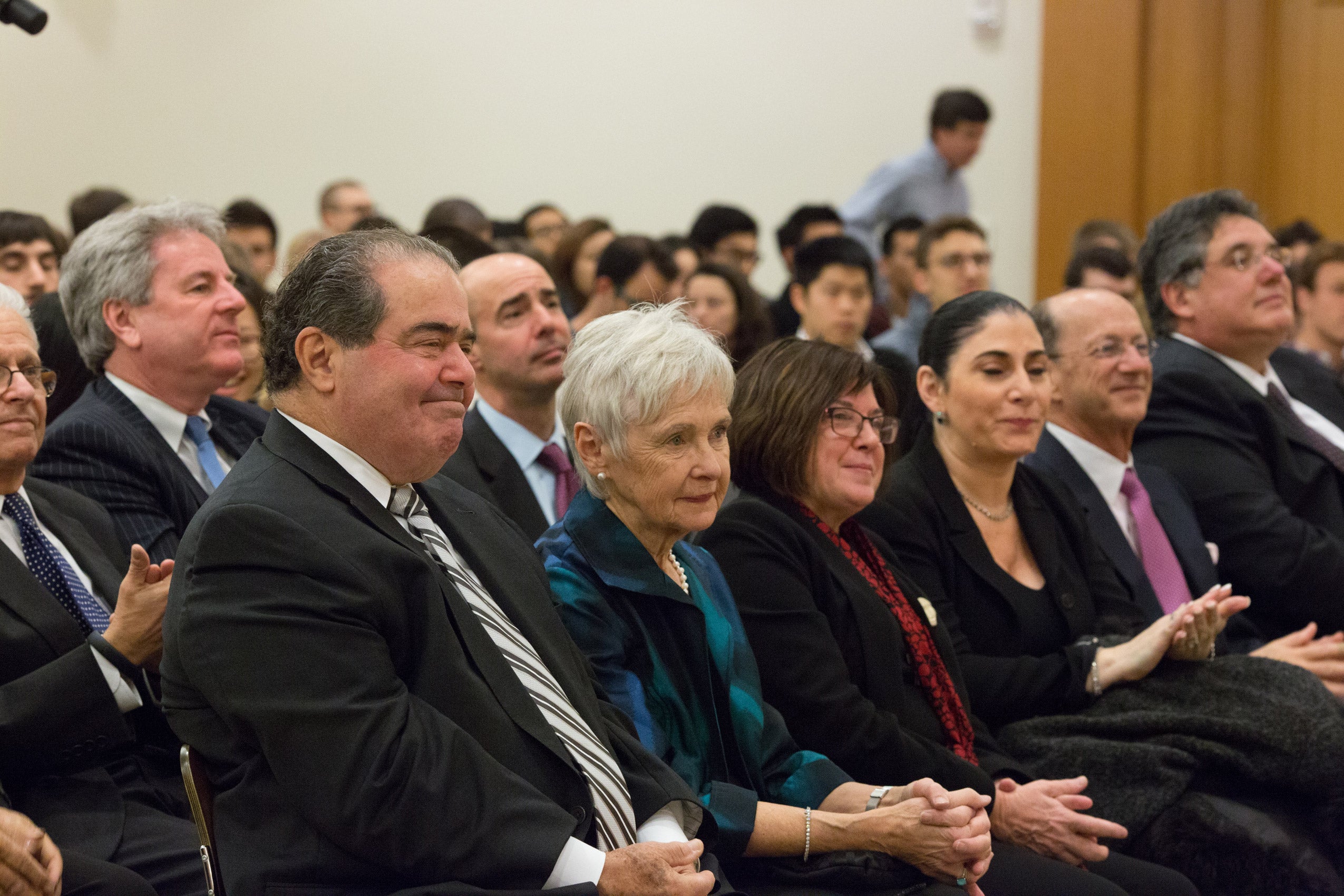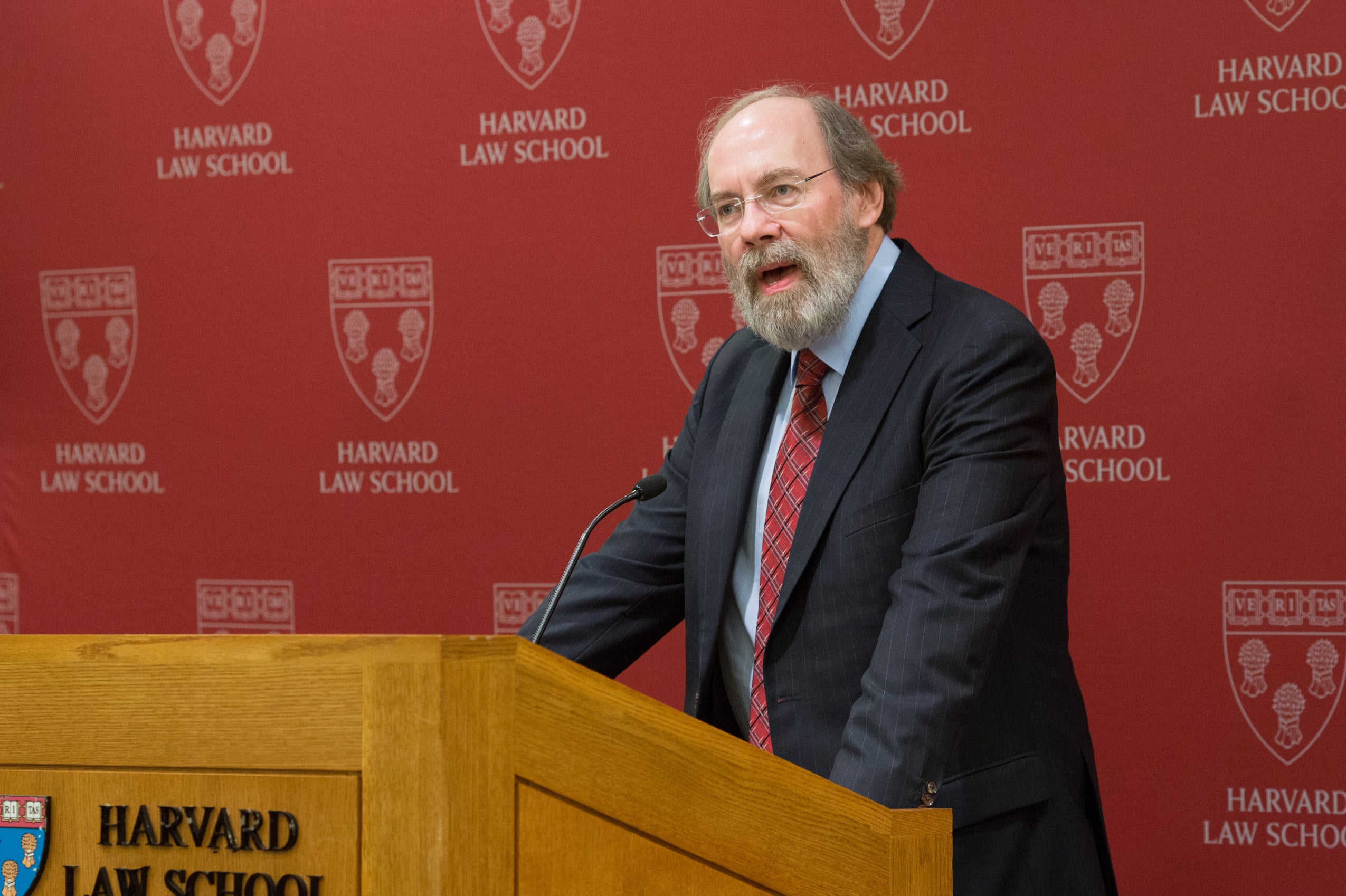On Monday, Nov. 17, Judge Frank Easterbrook of the Seventh Circuit Court of Appeals kicked off an inaugural lecture series named after his old friend, colleague and intellectual compatriot, Justice Antonin Scalia, who attended the talk titled “Interpreting the Unwritten Constitution.”
Easterbrook and Scalia were once colleagues on the faculty of the University of Chicago Law School and also as lawyers in the Ford Administration. Harvard Law School Dean Martha Minow invited Easterbrook to deliver the first in a series of lectures aimed at promoting and advancing the understanding of the founding principles and core doctrines of the U.S. Constitution. The series, funded by an anonymous donor, is set to include one lecture per academic year for ten years and involve speakers drawn from the fields of political science, history, philosophy, law, government, religion and related disciplines.
Easterbrook’s lecture sought to explain the connection between four Constitutional doctrines accepted by originalists, or those who favor interpreting the Constitution according to its original meaning and intent, despite the fact that those doctrines are not explicitly defined in the text of the Constitution: judicial review, intergovernmental tax immunity, sovereign immunity, and limits on the federal government’s ability to coerce states to take action, known as the anti-commandeering principle.
He began by describing a project he worked on with Justice Scalia when both were young attorneys serving under President Ford. Together, they were tasked to work on a report aimed at revealing a little-known directive under President Eisenhower that had involved the opening of mail going to and coming from the Soviet Union. Although a federal statute made opening mail a felony, the program continued even after an intervening Supreme Court decision holding that even searches required by national security nevertheless needed to be authorized by a warrant. The working group investigating the mail-opening scheme eventually concluded that it would be unjust to prosecute people who had executed a presidential order in good faith, but also published a report promising to prosecute any mail-opening that occurred in the future.

According to Easterbrook, Solicitor General Robert Bork and Attorney General Edward H. Levi signed off on both the report’s ultimate conclusion and its reasoning. But Scalia, who agreed with the decision not to prosecute, was dissatisfied with the report’s reasoning. Sitting back in his chair and glancing over the report, Scalia allegedly exclaimed, “You’re making it all up. You’re just making it all up.”
Easterbrook argued that Scalia was entirely right – the problem presented by the mail-opening regime had been novel and the Department of Justice was focused on explaining its own conduct, not necessarily binding future governments. “But when judges make it up, they purport to bind other people,” Easterbrook said. “The need to have a basis for a decision that forces strangers to change their conduct is a theme of Justice Scalia’s jurisprudence. And usually a judge must point to an authoritative text to impose such a duty. Making it all up is out of the question for a judge.”
Although making it up is forbidden, Easterbrook noted that in a few cases, Constitutional doctrines have evolved without a clear, textual provision one could point to. Although many of those doctrines – including the subjects of his talk, namely judicial review, intergovernmental tax immunity, sovereign immunity, and anti-commandeering – are legitimate despite a lack of textual basis, Easterbrook said, that lack of text imposes limits on what judges can do in their names and ultimately should require modifications to the current anti-commandeering and sovereign immunity doctrines.
Easterbrook traced the history of judicial review, famously laid forth in Marbury v. Madison, which declared that the Constitution is the supreme, binding law of the land and that the Supreme Court’s interpretation of Constitutional rules can control other branches. He then wove through a long Constitutional history of related doctrines, ultimately concluding that although the seeds for several unwritten doctrines could be found in Marbury and McCulloch v. Maryland, anti-commandeering and sovereign immunity had gone too far. Doctrines that are no longer justified by the rationales of those two early cases, Easterbrook said, are illegitimate, particularly where they lack a textual basis from which judges may rule.
The evolution of such rules is problematic, said Easterbrook, because they are largely judge-made in accordance with judicial review, which is meant to be historical, not progressive. Judicial review, he said, depends on the belief that rules laid down long ago could remain authoritative in the modern era. Where the decisions of long ago can no longer speak to the problems of today, democracy must fill the gaps. “I don’t lose sleep over the argument that this leaves us with a wooden Constitution or rule by a dead hand,” Easterbrook said. “When there is no definitive decision in the document, we don’t have anything dead. We have decision by living majorities.”
